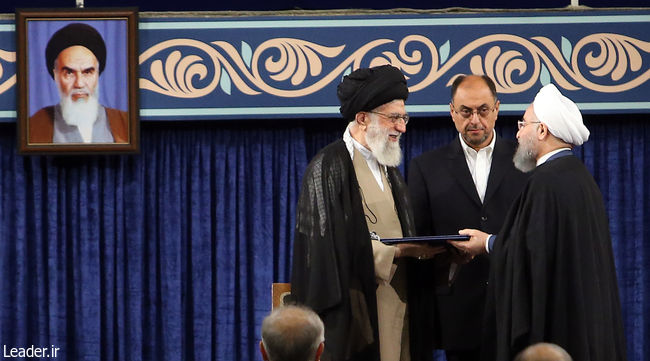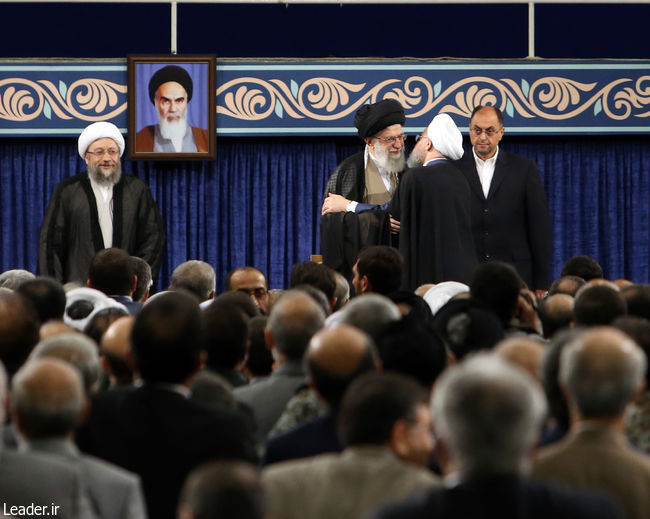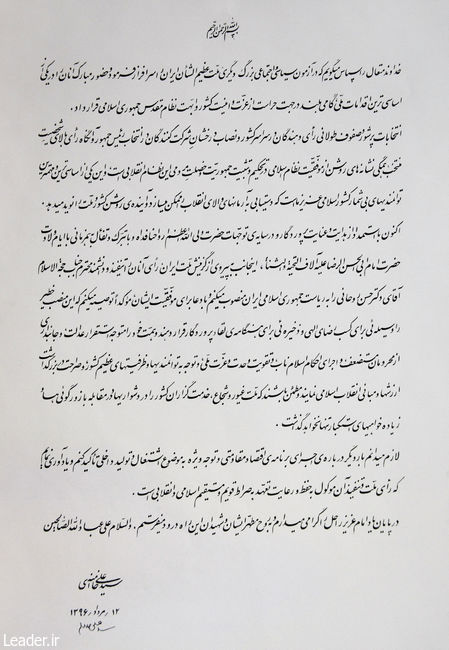The 12th presidential endorsement ceremony was held at the Imam Khomeini Husseiniyeh Thursday morning attended by Islamic establishment’s officials, civil and military figures, and ambassadors of foreign countries. During the ceremony, the Leader of the Islamic Revolution validated vote of the nation by appointing Hojjatoleslam Hassan Rouhani as president of the Islamic Republic of Iran.
In his decree, Ayatollah Khamenei described the vibrant presidential election and the high vote garnered by the elected person as a sign of the strength of the republic aspect of the Islamic establishment, and while highlighting the need to implement the provisions of the Economy of Resistance, addressed the president, saying, “Focus your efforts on the establishment of justice, supporting the oppressed people, implementing the pure commands of Islam, reinforcing national unity and dignity, paying attention to the huge capabilities and potentialities of the country, and outspokenly venerating the values and principles of the Islamic Revolution.”
The text of the Leader’s decree, which was read out by Hojjatoleslam Mohammad Mohammadi-Golpayegani, is as follows:
In the Name of God, the Most Compassionate, the Most Merciful
I thank the Almighty God, who helped the grand nation of Iran hold its head high through another major social and economic test, and rendered their auspicious presence in one of the most fundamental national measures a long stride in the direction of safeguarding the dignity and security of the country and grandeur of the sacred establishment of the Islamic Republic.
The vibrant elections and long voter lines across the country in addition to high voter turnout in the presidential election and the high vote cast for the elected person are all clear signs of the success of the Islamic establishment in consolidating and establishing republicanism and the popular nature of this revolutionary establishment, and this is one of the most fundamental and important of numerous capabilities that our beloved Islamic country has, which makes achievement of the lofty goals of the revolution possible and heralds a bright future for the country and nation.
Now, while asking for God’s guidance and favor and under the aegis of the attention paid by Hadhrat Valiollah al-A’zam (May Our Souls Be Sacrificed for Him) and in view of the blessing and the concurrence [of this event] with the days that mark birth anniversary of Hadhrat Imam Abi al-Hassan al-Reza (PBUH), I hereby, in conformity with the choice of the Iranian nation, endorse their vote and appoint esteemed scholar, Hojjatoleslam Dr. Hassan Rouhani, as president of the Islamic Republic of Iran, and while praying for his success, emphatically recommend that he regard this grave position as a means to obtain divine satisfaction and saving for the moment of facing the Lord, and [advise him to] direct his efforts toward establishing justice, supporting the oppressed underprivileged people, implementing the commands of the pure Islam, consolidating national unity and dignity, and paying attention to the great capabilities and potentialities of the country, and be outspoken in venerating the values and principles of the Islamic Revolution, and rest assured that the proud and courageous nation will not abandon the servants of the country in difficulties and in countering bullying and excessive demands of the [global] Arrogance.
I deem it necessary to once more stress the [need for] implementation of the Economy of Resistance plan and paying special attention to the issue of employment and domestic production, and remind that the vote of the nation and its endorsement is contingent upon safeguarding and honoring the commitment to [standing fast on] the unwavering and undeviating Islamic and revolutionary path.
In conclusion, I revere the memory of the dear late Imam [Khomeini] and salute his purified soul and the martyrs of this path. Peace be upon the righteous servants of Allah.
Seyyed Ali Khamenei
Mordad 12, 1396 (August 3rd, 2017)
In his remarks in this ceremony, the Leader of the Islamic Revolution congratulated the birth anniversary of Imam Reza (PBUH), and described as a source of blessing the coincidence of the endorsement ceremony with the birth anniversary of that Imam. The Leader then pointed to the high importance of the ceremony, saying, “One of the reasons for the importance of this ceremony is the beginning of a new era in management of the country and it is hoped that the esteemed president and his accompanying officials in the new term, would meet the demands of the people and please them through innovations and [boosting their] capabilities more than before.”
He enumerated “the role played by the people in electing the top-echelon managers of the country” as the second reason behind very high importance of the endorsement ceremony and added, “This endorsement ceremony is the twelfth such ceremony after the victory of the Islamic Revolution, which shows the effectiveness of the vote and choice of the people and this great achievement has been realized as a blessing of the Revolution.”
Pointing to election of ten terms of the Islamic Consultative Assembly (Majlis), five terms of the city and village Islamic councils and five terms of the Assembly of Experts through votes of the people from the victory of the Revolution until now, the Leader of the Islamic Revolution said, “Prior to the Islamic Revolution due to the presence of a dictatorship, people had no role in determining the country’s managers, but as a blessing of the Islamic Revolution and the robust determination, strong faith, endless insight and unique courage of such a great man as the late Imam, the people came to the fore from the peripheries and gained control [of the country’s affairs].”
Ayatollah Khamenei reiterated, “The country’s new generation and youth have not witnessed the pre-Revolution era, but the role played by the people in the government is a major achievement through which the honorable Imam succeeded to put an end to years and centuries of monarchial and hereditary rule and foreign meddling and dominance by mobilizing the ocean of the nation, and change the direction of the country’s and nation’s movement.”
Reiterating that the people and officials must be proud of four decades of “religious democracy and the role played by the people in the affairs of the country and in electing officials,” the Leader said, “Officials who will take office in the new term are heirs to forty years of effort and innovation by various officials, who created many scientific, practical and intellectual infrastructures, which never existed prior to the revolution.”
The Leader of the Islamic Revolution described these infrastructures as the nation’s launch pads to the future and emphasized, “The new officials and those accompanying the honorable president must make use of four decades of experience and accumulated capacities, and deliver it to subsequent managers and by adding to this national asset.”
Ayatollah Khamenei described the raising of new generations with revolutionary way of thinking and brimming with motivation and ready for work as one of the blessings of the Islamic Revolution. The Leader then urged the officials to take advantage of this great product, adding, “Another achievement of four decades of [the country’s] management by the Islamic Republic establishment has been the interaction of the Iranian nation with the world and, at the same time, serious confrontation with the hegemonic system and resistance against the ploys of ill-wishers.”
In the same part of his remarks, the Leader said, “One of the points, which I insist on repeating so as not to slip into oblivion, is not neglecting the ‘presence of ploy of the enemy’.”
The Leader of the Islamic Revolution then added, “We should never forget that the enemy is busy devising [plots] and showing hostility, but by the Grace of God, the nation and officials have grown more hardened over the past four decades.”
Pointing to the existence of sanctions from the outset of the Islamic Revolution and particularly in recent years, Ayatollah Khamenei said, “Although sanctions caused some problems, they made us pay attention to domestic potentialities and capabilities and take advantage of them, and therefore, today, despite the will of the enemy, Iran is much stronger and more powerful than the early years of the revolution.”
The Leader pointed to various ploys used against Iran in past years and said, “In these years, some people, like the current US officials, were openly hostile to the Iranian nation, and the ploy used by some others was like a cast-iron hand covered by velvet gloves. However, all these designs increased self-confidence of the people and officials in order to discover ways of countering the enemy’s ploys.”
Emphasizing that the Islamic Republic has no fear of the ill-wishers’ ploys and knows how to deal with them due to the plentiful potentialities of the country, the Leader of the Islamic Revolution said, “The officials of the new administration must know that they are at the helm of such a highly potent and talented establishment and these [talents] must be taken advantage of after being identified.”
Ayatollah Khamenei urged the new executive officials to “rely on the revolutionary identity, jihadi work and making use of people’s support as well as the country’s spiritual and material assets.” Explaining about three main stances to be adopted by the next administration, the Leader added that “Addressing people’s problems, particularly the livelihood and economic problems,” as the foremost priority, as well as “widespread interaction with the world and expansive contacts with nations and governments,” and “firmly and robustly standing up against hegemonic powers,” were three main stances that must be simultaneously put on the agenda of the new administration.
The Leader of the Islamic Revolution described the regime of the Unites States of America as more aggressive and brazen than all of the hegemonic powers and reiterated, “Four decades of international activity has shown that the price of submitting to bullying powers is much higher than the price of standing up against them.”
Reiterating that “submission” makes nations miserable and blocks the path to progress to them, Ayatollah Khamenei added, “With divine assistance, the Islamic Republic has never submitted to Arrogance and the hegemonic system and has never compromised on their demands, and due to blessing of martyrs’ self-sacrifice and selflessness, today, in addition to having more power and progress, has made its slogans more prominent.”
Elsewhere in his remarks, the Leader of the Islamic Revolution offered 10 recommendations to the esteemed president and his colleagues.
“Seeing the responsibility [of governing people] as a trust and safekeeping it,” “setting priorities when making plans and spending budget, especially on uprooting poverty and corruption,” and “going ahead on the basis of the sixth [economic development] plan,” were the first three recommendations offered by Ayatollah Khamenei.
Stating his fourth recommendation, the Leader advised the officials to consider “the unity of the nation” as important and safeguard it and take care that tensions and harmful divisions are not created among the people.”
Ayatollah Khamenei pointed to the varied tastes of the people and noted, “Allow people with various tastes to live a peaceful life along one another.”
In his fifth recommendation to the president and future government, the Leader of the Islamic Revolution said, “Do not be upset with opposing views, because there are flaws in difficult jobs and responsibilities and you have to allow the critics to express their views by accepting and tolerating criticism.”
In his next recommendation, the Leader urged the executive officials to go among the people and connect with them without any intermediaries. Further on, the Leader stated his seventh recommendation, saying, “Appreciate the faithful, revolutionary and highly-motivated forces, because it is these very revolutionary forces that safeguard the country and stand tall in difficult times.”
The eighth recommendation offered by the Leader of the Islamic Revolution to officials was not to forget the hostility of the enemies, where he said, “Always remember in your decision-making and international interactions that the enemy is doing all it can to destroy you and uses any pretext [to achieve this goal] as well.”
Ayatollah Khamenei pointed to the recent hue and cry by Western countries’ over the launch by Iran of a satellite-carrier rocket into space, adding, “The launch of this satellite-carrier rocket was a scientific and technical and routine, and of course necessary, work for the country, but they kick up a fuss even over this issue.”
The next recommendation of the Leader of the Islamic Revolution to the executive officials was the need for strong, jihadi and calculated work in economic, cultural and defense areas, in addition to preserving Islamic and revolutionary identity of the nation to counter the ill-wishers’ ploys and excuses and give a proper answer to them.
Stating his tenth and last recommendation to the officials, Ayatollah Khamenei said, “Trust in God and believe in the promise about the divine support.”
In conclusion, the Leader stressed that one should not remain idle in the face of opponents of religion and lawbreakers, noting, “Know that the future belongs to you.”
During the ceremony, Mr. Hassan Rouhani, the president of Iran, expressed his congratulations on the auspicious birth anniversary of Imam Reza (PBUH) and pointed to the victory of the Islamic Revolution and the legacy of the late honorable Imam for the people, including self-confidence, dignity, independence and freedom. He added, “In order to build a future, which is the manifestation of freedom, security, peace and progress, we have no choice but to further rely on the endless capabilities of the nation.”
Rouhani described “uprooting poverty and corruption,” “curbing inflation,” “making Iran proud in international circles” and “gaining access to regional and global markets” as the rights of the people and added, “‘Growth of a free and spiritual atmosphere’, ‘easy access to information’, ‘equality in the face of law’, ‘being confident about one’s future’, ‘[freedom for] voicing one’s opinion and dialogue’, and ‘being informed of the affairs of the country’, are also among the rights of the people.”
Pointing to the trustworthiness of the establishment with regard to the people’s votes, the president said, “In this election [and] through the language of ballots, the people once again reaffirmed their allegiance to the establishment, the Leader, the administration and their elected one, and now the responsibility falls on our shoulders.”
Rouhani described “religious democracy” as a blessing of the Islamic Republic and said, “Undoubtedly, this great achievement is owed to the leadership of the late Imam and the Leader of the Islamic Revolution, who have provided the ground for the growth of the offspring of the revolution with various political tastes through their strategic view and fatherly policy and tolerance.”
The president enumerated “social justice” and “elimination of poverty” as among the ideals of the Islamic Revolution, saying, “The 11th administration took some important steps through ‘restoration of economic stability’, ‘reduction of inflation’, and ‘boosting in public services’ such as the establishment of public insurance and implementation of the health system development plan, but the state of poverty and inequality in the country is still not befitting of the nation and becoming to the Islamic Republic.”
Rouhani described “complete eradication of absolute poverty from the Iranian society” and the “creation of a comprehensive social security system” as among the main objectives of the 12th administration, adding, “The elimination of poverty depends on the creation of jobs and creation of jobs and generation of wealth requires extensive investment and access to [global] markets and advanced technologies.”
The president described “increasing [domestic] production and job creation” as the main priority of the 12th administration, adding, “We have devised our economic plan on the basis of the general policies of the establishment, especially the policies of the Economy of Resistance and Article 44 [of the Iranian Constitution] with the goal of bringing about an economic revolution.”
Underlining the need for interaction with the world, Rouhani added, “Weathering the toughest sanctions was made possible through a combination of ‘powerful diplomacy’ and ‘possession of defensive deterrent power.’”
The president described the 2015 nuclear deal between Iran and six world powers – known as the Joint Comprehensive Plan of Action (JCPOA) – as a sign of Iran’s goodwill for global interaction, saying, “Now, with the support of the people who created the great epic of the elections, we stress [the necessity of] constructive and effective interaction with the world within framework of the Constitution.”
Rouhani described the conclusion of the elections as the beginning of a new era of “harmony and cooperation” and added, “It is now time for everyone to promote the efficiency of the establishment and obtain people’s satisfaction through dialogue and choice of the best solutions and [also] by taking advantage of the power and innovation of all creative forces.”
At the beginning of the session, Iran’s Minister of Interior Abdolreza Rahmani Fazli presented a report on the process of the 12th presidential election.
Rahmani-Fazli described the most important message of the huge turnout in the elections as people’s belief in the ideals of the Islamic Revolution and added, “Security, wholesomeness, lawfulness and maximum turnout were the four important features of the recent elections.”
The interior minister pointed to efforts made to safeguard people’s votes and ensure security of the elections, saying, “The presidential election was held in 62,381 polling stations across the country and in 103 countries of the world, and eventually the Guardian Council verified authenticity of the elections without invalidating even a single ballot box.”



